 British blues woman Dani Wilde has gotten a
significant amount of acclaim recently because of
her collaborative efforts with Samantha Fish and
Cassie Taylor on Ruf Record's Girls With Guitars
album and subsequent tours. Her 2009 debut release,
Heal My Blues, received a favorable
review from Blues Bytes veteran Graham Clarke,
as he pointed out that "She's well on the way to
being compared favorably with those ladies who
initially inspired her to play the blues."
British blues woman Dani Wilde has gotten a
significant amount of acclaim recently because of
her collaborative efforts with Samantha Fish and
Cassie Taylor on Ruf Record's Girls With Guitars
album and subsequent tours. Her 2009 debut release,
Heal My Blues, received a favorable
review from Blues Bytes veteran Graham Clarke,
as he pointed out that "She's well on the way to
being compared favorably with those ladies who
initially inspired her to play the blues."
With the release of
her second solo CD, Shine (Ruf Records),
produced by Mike Vernon, all
signs point to Wilde's career really starting to
take off.
The album kicks off with the pleasant title cut,
with Wilde playing acoustic guitar at the beginning.
Her brother Will later comes in with some nice
harmonica playing and there's a nice mix of
background vocals throughout the number. It's a
catchy song that grows on you with repeated listens.
It's been done before and this version doesn't stray
far from the Rolling Stones original, but I like her
take on "Miss You." It's her sultry and at times
sassy vocals that makes it distinctive from the
Jagger version. What really carried the original was
Sugar Blue's harmonica riffs, and brother Will does
a good job of bringing the same harp sounds to the
Wilde rendition.
Shine really takes off with the fourth cut,
the soulful gospel-influenced "How Do You Do It."
Wilde puts down the guitar and focuses strictly on
singing here, and winds up doing her best vocal work
on the CD. No doubt about it ---- she's an excellent
guitar player but could make a career strictly out
of being a singer if she so desired. But don't worry
about missing out on hot guitar licks on this
number, as Laura Chavez does a great job of filling
in with a very nice solo. For my money, "How Do You
Do It' is the highlight of the CD.
Wilde keeps up the momentum on the next cut, the
mid-tempo blues shuffle "Red Blooded Woman," on
which she picks up the guitar leads again while her
brother blows some very nice blues harp. Wilde then
plays the pleading, tortured female role quite well
in the very nice "Don't Give Up On Me."
One of Wilde's passions outside of music is support
of schools and orphanages in an impoverished area of
Kenya, and she ties into that effort on the slow
blues "Abandoned Child," on which a spoken word
intro comes from one of the African children that
she holds so dear. Wilde's guitar playing is truly
inspired on this number --- it's her best
instrumental work on the album. It's obvious that
her heart is really in this one as she sings, "Seems
that some are born with privilege, and some are born
and die in pain."
Wilde again steps to the microphone for "Where Blue
Begins," allowing Stuart Dixon to shine with some
very good Chicago-style blues guitar. Martin
Winning, like others on this album a member of Van
Morrison's touring band, contributes a very nice
tenor sax break.
Shine ends nicely with a solo acoustic
number, "Big Brown Eyes," with Wilde again singing
passionately while accompanying herself on guitar.
It's a very nice conclusion to a wonderful CD.
Dani Wilde is most definitely a blues star on the
rise. Read more about her music and her charity work
at
www.daniwilde.com. And get this CD soon --- you
won't regret it. It's one of the best I've heard
this year.
--- Bill Mitchell
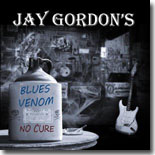 The new CD, No Cure! (Shuttle Music) from
California four-piece band
Jay Gordon's Blues Venom is quite easy to
describe. The music on No Cure! falls under
the category of "hard drivin', ass kickin', shot and
a beer, park your motorcycle in the back, no holds
barred" blues/rock. Gordon is a strong guitar player
who holds nothing back when he straps on his Fender
guitar and steps to the front of the stage. He also
handles most of the vocals on the album --- while
he's not a great singer, he's good enough for the
material here.
The new CD, No Cure! (Shuttle Music) from
California four-piece band
Jay Gordon's Blues Venom is quite easy to
describe. The music on No Cure! falls under
the category of "hard drivin', ass kickin', shot and
a beer, park your motorcycle in the back, no holds
barred" blues/rock. Gordon is a strong guitar player
who holds nothing back when he straps on his Fender
guitar and steps to the front of the stage. He also
handles most of the vocals on the album --- while
he's not a great singer, he's good enough for the
material here.
No Cure! opens with a Gordon original,
"Dockery's Plantation," a slow blues that pays
tribute to Robert Johnson. "World Blues" is a
mid-tempo shuffle, a topical number that covers a
lot of the problems plaguing the world today but
with every refrain ending with the rather
interesting line "... last night I saw Jesus turn my
beer into wine." Interesting.
Two guests supplement the regular band on a few of
the cuts, with the harmonica player being Mario
Ramirez, younger brother of Richie Valens. Ramirez
gets in a couple of good harp solos in the middle of
the frantic blues shuffle "Mister Max." Rich Wenzel
plays Hammond B3 on "Blues Venom" and the
aptly-named "Kickin Blues Ass," while Ramirez also
shows up again on this cut.
Most of the songs on this CD are originals, but the
band works in a few covers such as Slim Harpo's
"King Bee." This one bears little resemblance to the
Excello Records version recorded by Harpo.
After a couple of live cuts that threaten to take
everyone over the edge, the disc ends with a tribute
to the late bluesman Phillip Walker, "Wiskey Women
And Fast Cars" (sic). This blues shuffle features
some nice piano playing from Harlen Spector.
No Cure! is not music for the faint of heart.
It's not something you're going to put on in the
background during a relaxing meal. It's not going to
be an essential disc in your collection. But if hard
drivin' guitar blues/rock is your thing, then check
it out at Gordon's
website. Or if you're cruising the back streets
of Southern California, look for them at a tavern
near you.
--- Bill Mitchell
 There have been several books published over the
years that included tracing the roots of the blues
back to its origins in West Africa. However, very
few of these books have covered the subject
comprehensively, or have been written from the
perspective of the West African. Dr. Pascal Bokar
Thiam has taken care of that shortcoming with
the publication of From Timbuktu to The
Mississippi Delta: How West African Standards and
Aesthetics Shaped the Music of the Delta Blues (Cognella).
There have been several books published over the
years that included tracing the roots of the blues
back to its origins in West Africa. However, very
few of these books have covered the subject
comprehensively, or have been written from the
perspective of the West African. Dr. Pascal Bokar
Thiam has taken care of that shortcoming with
the publication of From Timbuktu to The
Mississippi Delta: How West African Standards and
Aesthetics Shaped the Music of the Delta Blues (Cognella).
Dr. Thiam serves on the faculty of the University of
San Francisco and the French American International
School. He teaches jazz and world music courses in
the Performing Arts Division. He also plays guitar
and sings and is of French and Senegalese descent.
His book covers the history of West Africa, tracing
its culture from ancient times (the empires of
Ghana, Mali, and Songhai) to the days when the
region opened trade with Europe, Asia, and Arabia,
thereby spreading the culture to other areas,
especially their music.
Dr. Thiam also shows how the region spread their
culture throughout the world via the arts, and we
see how many of the instruments used a thousand
years ago are still making music today in somewhat
modified forms. Unfortunately, many times the
culture was spread against their will as many West
Africans became part of the slave trade, but they
carried their music with them to other countries,
and it played a major role in the development of the
blues.
There are many colorful pictures and illustrations
in the book of African artifacts, dancers,
musicians, instruments, and their modern
counterparts. Of course, the author knows his
subject well, but wisely he doesn’t talk above his
readers’ heads. His prose is sharp and easy to
understand. It’s the best kind of book….it educates
and entertains at the same time. From Timbuktu to
The Mississippi Delta is highly recommended for
students of history and the blues.
 As previously mentioned, Dr. Thiam is a guitarist
and singer, and he also has a CD available, called
Savanna Jazz Club (Savanna Jazz Records),
which focuses on the blues side of jazz, mixed with
Sengelese rhythms. Dr. Thiam’s fleet-fingered style
and and rich tone will remind you of jazz masters
like Grant Green, George Benson and Wes Montgomery.
He works through a diverse set of standards (Charlie
Parker’s “Donna Lee,” Dizzy Gillespie’s “Tanga,”
“How High The Moon,” and Green’s “Out of Nowhere,”
with support from a percussion section that includes
jazz drummer Donald “Duck” Bailey, and a quartet of
Senegelese drummers. You don’t have to be a jazz fan
to enjoy this set. Good music transcends genres and
Savanna Jazz Club qualifies as good music.
As previously mentioned, Dr. Thiam is a guitarist
and singer, and he also has a CD available, called
Savanna Jazz Club (Savanna Jazz Records),
which focuses on the blues side of jazz, mixed with
Sengelese rhythms. Dr. Thiam’s fleet-fingered style
and and rich tone will remind you of jazz masters
like Grant Green, George Benson and Wes Montgomery.
He works through a diverse set of standards (Charlie
Parker’s “Donna Lee,” Dizzy Gillespie’s “Tanga,”
“How High The Moon,” and Green’s “Out of Nowhere,”
with support from a percussion section that includes
jazz drummer Donald “Duck” Bailey, and a quartet of
Senegelese drummers. You don’t have to be a jazz fan
to enjoy this set. Good music transcends genres and
Savanna Jazz Club qualifies as good music.
--- Graham Clarke
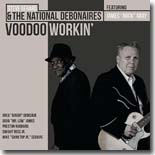 I’m always open to hearing musicians take the blues
in new directions, but when somebody makes the
attempt to do a recording like they used to be done
in the ’50s or early ’60s, it always puts a hop in
my step. Such an example is the latest release by
Steve Gerard & the National Debonaires, called
Voodoo Workin’ (Blue Edge Records). This
latest release, their third overall, finds the band
shifting somewhat from the jump blues and shuffles
of their first two efforts and moving more toward
Southern blues and soul, with the able assistance of
Jackson, MS-based singer James “Rock” Gray.
I’m always open to hearing musicians take the blues
in new directions, but when somebody makes the
attempt to do a recording like they used to be done
in the ’50s or early ’60s, it always puts a hop in
my step. Such an example is the latest release by
Steve Gerard & the National Debonaires, called
Voodoo Workin’ (Blue Edge Records). This
latest release, their third overall, finds the band
shifting somewhat from the jump blues and shuffles
of their first two efforts and moving more toward
Southern blues and soul, with the able assistance of
Jackson, MS-based singer James “Rock” Gray.
Gray’s smooth, relaxed vocal style suits the
material perfectly. Of the ten tracks, seven will be
familiar to most blues fans, ranging from the swamp
blues of Charles Sheffield’s title track and Jimmy
Anderson’s “Ain’t Gonna Let Her Go,” which opens the
disc, to Chicago-style (Willie Mabon’s “Michelle” )
to Crescent City R&B (Fats Domino’s “My Girl
Josephine” and Jay McNeely’s “There Is Something On
Your Mind”) to jazzy swing (Nappy Brown’s “My
Girl”). Gray also contributes three original
compositions (“Please Stay With Me,” “One of These
Days,” and “Sweet Little Woman,” all of which lean
toward the soul/R&B side.
The Debonaires are a tight little unit. Gerard’s
guitar work, economical, but on the money, is
impressive. The rest of the band (keyboardist Mike
Sedovic, drummer Dwight Ross, Jr., bass player
Preston Hubbard, tenor sax man Doug James, and
harmonica player Greg Demchuk) are outstanding.
If old school blues and soul in a southern vein are
what you’re looking for, Steve Gerard & the National
Debonaires have just what you need with Voodoo
Workin’. This is the real deal, folks!
--- Graham Clarke
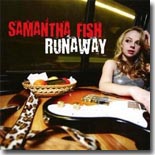 22-year-old singer/guitarist Samantha Fish’s
Coming-Out Party continues with her stunning debut
release for Ruf Records, Runaway. The Kansas
City dynamo was already turning heads with her
performance on the recent Ruf release, Girls With
Guitars, where she shared the spotlight with
Dani Wilde and Cassie Taylor, along with the
accompanying tour, which is still going strong.
Taylor lends a hand on Runaway, playing bass
and contributing background vocals, and GWG
producer, Mike Zito, produces this release as well.
22-year-old singer/guitarist Samantha Fish’s
Coming-Out Party continues with her stunning debut
release for Ruf Records, Runaway. The Kansas
City dynamo was already turning heads with her
performance on the recent Ruf release, Girls With
Guitars, where she shared the spotlight with
Dani Wilde and Cassie Taylor, along with the
accompanying tour, which is still going strong.
Taylor lends a hand on Runaway, playing bass
and contributing background vocals, and GWG
producer, Mike Zito, produces this release as well.
From the opening track, the hard-driving “Down In
The Swamp,” it’s obvious that Fish is something
special. She’s equally comfortable with fast-paced
boogie tracks (the great title track), soulful blues
(“Today’s My Day”), hard rock (“Leavin’ Kind”),
blues/rock (“Push Comes To Shove,” with Zito sharing
lead vocals), roots (“Louisiana Rain”), and even
jazz (the closer, “Feelin’ Alright,” which also
features a sultry vocal from Fish).
If you’ve heard Girls With Guitars, you
already know what a powerhouse guitarist Fish is,
but her vocals really stand out on Runaway,
due to their versatility. She’s as close to a total
package as one can get at the tender age of 22. This
is a strong debut release that foreshadows even more
good things down the road for Samantha Fish.
--- Graham Clarke
 Misery Loves Company, the latest release from
Mary Flower on Yellow Dog Records, finds the
amazing guitarist pairing up with some of roots
music’s finest musicians, mostly based in the
Portland, Oregon area where she lives. The result is
a stripped-down affair that really brings Flower’s
talents, incredible technique and interpretive
skills, to the forefront on a dozen songs mixing
stunning original compositions with well thought-out
recreations of classic blues tunes.
Misery Loves Company, the latest release from
Mary Flower on Yellow Dog Records, finds the
amazing guitarist pairing up with some of roots
music’s finest musicians, mostly based in the
Portland, Oregon area where she lives. The result is
a stripped-down affair that really brings Flower’s
talents, incredible technique and interpretive
skills, to the forefront on a dozen songs mixing
stunning original compositions with well thought-out
recreations of classic blues tunes.
You might be familiar with some of the guests on
Misery Loves Company. Colin Linden, the lone
non-Portland resident on the disc, has played a
prominent role in some of the best roots/blues music
of the past couple of years (including producing
fellow Yellow Dog artist Eden Brent’s latest
effort). He did final mixing on this disc and also
added electric dobro to Flower’s haunting “Way Down
In The Bottom.” Harmonica player Curtis Salgado
helps Flower open the disc with the laidback romp,
“Hard Days Blues,” and noted jazz pianist and
composer Dave Frishberg lights up her darkly
humorous “I’m Dreaming of Your Demise.”
Other highlights include a gentle interpretation of
Son House’s “Death Letter Blues,” that pairs Flower
with guitarist Alan Hagar, “Jitters,” with tuba
player Mark Vehrencamp, Tampa Red’s “Boogie Woogie
Dance,” featuring some of Flower’s outstanding slide
guitar along with bassist Jesse Withers, “Recession
Rag,” with mandolin player Brian Oberlin, and “Shake
Sugaree,” with Johnny B. Connolly on accordion. On
the final track, “Scrapper’s Blues”, Flower goes it
alone, paying tribute instrumentally to one of her
musical heroes, Scrapper Blackwell.
Mary Flower has enjoyed a lengthy career in music,
over 30 years, travelling just under the musical
radar most of the time, despite the fact that she’s
one of the best guitarists currently performing.
Misery Loves Company proves that fact and ranks
with her best work. This is great music to enjoy
while riding the porch swing on an easy Sunday
afternoon.
--- Graham Clarke
 For over 50 years, Bernie Pearl has been
playing blues guitar, working as a DJ, producer, and
leading his own band. His last project was the
ambitious and impressive 2008 double-CD set called
Old School Blues, which paid tribute to his
musical influences, both acoustic and electric. His
latest release is a live set, recorded at Boulevard
Music in Culver City, CA, called Sittin’ on the
Right Side of the Blues (Major Label
Recordings).
For over 50 years, Bernie Pearl has been
playing blues guitar, working as a DJ, producer, and
leading his own band. His last project was the
ambitious and impressive 2008 double-CD set called
Old School Blues, which paid tribute to his
musical influences, both acoustic and electric. His
latest release is a live set, recorded at Boulevard
Music in Culver City, CA, called Sittin’ on the
Right Side of the Blues (Major Label
Recordings).
Accompanied only by Michael Barry on upright bass,
Pearl rips through a 15 song set that features six
original compositions mixed with nine well-chosen
covers, ranging from tunes written by Lightnin’
Hopkins (“Jailhouse Blues” and “Shinin’ Moon”),
Mance Lipscomb (“Night Time Is The Right Time”),
Fred McDowell (“New Hollow Log Blue,” “I Believe
I’ll Carry My Hook,” and “Shake ‘em Down”), Son
House (“Shetland Pony Blues”), Muddy Waters (“Can’t
Be Satisfied”), and a song from the obscure
Louisiana country bluesman Herman Johnson (“I Keeps
On Wanting You”). Though some of these songs will be
familiar to most blues fans, Pearl manages to
breathe new life into them.
The originals are all solid and include the
autobiographical title track, a pair of nice
instrumentals (“Outside Boogie” and the Mississippi
John Hurt tribute….or is it…. “I Ain’t Hurt”), and
the humorous “Flat-Footed,” which was inspired in
part by long time collaborator Harmonica Fats, and
“I’m Up A Tree.”
Pearl’s warm, confident vocals are spot-on. Wisely,
he doesn’t try to emulate the original singers, but
does them in his own voice, which serves just fine,
thank you. His guitar work indicates that he learned
his lessons well from most of these artists over the
years. He also enjoys a nice rapport with the
audience that carries over to the listener.
In short, with Sittin’ on the Right Side of the
Blues, Bernie Pearl has presented us with an
enjoyable recording of acoustic blues favorites,
along with some cool new songs, that deserves a spot
in any acoustic guitar fan’s steady rotation.
--- Graham Clarke
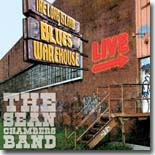 One of 2009’s best blues releases was Sean
Chambers’ Ten ‘Til Midnight, which
accumulated a boatload of favorable press from
various publications (including this one) and
remained on the Living Blues chart for the
first three months after its release and got lots of
airplay in the U.S. and overseas. For an encore,
Chambers has issued Live from the Long Island
Blues Warehouse (Blue Heat Records), which
captures one of his incendiary live performances
from earlier this year.
One of 2009’s best blues releases was Sean
Chambers’ Ten ‘Til Midnight, which
accumulated a boatload of favorable press from
various publications (including this one) and
remained on the Living Blues chart for the
first three months after its release and got lots of
airplay in the U.S. and overseas. For an encore,
Chambers has issued Live from the Long Island
Blues Warehouse (Blue Heat Records), which
captures one of his incendiary live performances
from earlier this year.
Chambers offers up 11 smoking-hot tracks, most of
them faithfully reprising songs from his previous
three CDs, backed by his powerful band (Paul
Broderick – drums, Tim Blair – bass, Gary Keith –
harmonica). In a way, this set represents a “Best
of….to date” collection, which will come in handy
for those fans who have not heard the standout songs
from Chambers’ first two releases, such as “Strong
Temptation,” “Crazy For Loving You,” “Danger Zone,”
and the psychedelic instrumental opener, “Dixie 45.”
Chambers also pulls out a pair of great cover tunes,
including The Kinsey Report’s classic “Full Moon on
Main Street” and a scorching version of Elmore
James’ “Dust My Broom.” There’s also one new
original, the aptly titled “Hip Shake Boogie.” The
real show stopper, however, is the 10-minute-plus
Guitar Heaven closer, “In the Winter Time,” from his
last CD.
If you liked Sean Chambers’ last CD, you will love
his latest one. It grabs you from the get-go and
refuses to turn you loose. I promise you won’t mind
though.
--- Graham Clarke
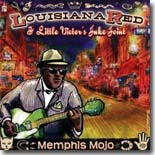 Louisiana Red’s last release, Back to the
Black Bayou, was nominated for five Blues Music
Awards in 2010, winning two of the prestigious
awards at the ceremony in Memphis. Two days later,
Red was in a Memphis studio, leading an awesome band
led by guitarist/producer Little Victor and
harmonica wizard Bob Corritore through the paces for
his latest release on Ruf Records, Memphis Mojo.
Louisiana Red’s last release, Back to the
Black Bayou, was nominated for five Blues Music
Awards in 2010, winning two of the prestigious
awards at the ceremony in Memphis. Two days later,
Red was in a Memphis studio, leading an awesome band
led by guitarist/producer Little Victor and
harmonica wizard Bob Corritore through the paces for
his latest release on Ruf Records, Memphis Mojo.
As on the previous release, which he also produced,
Little Victor captures perfectly the rawness and
intensity of Louisiana Red. Red wrote 11 of the 12
tracks here, two co-written with Victor, and despite
his prolific recording schedule over the past couple
of decades, his songs maintain their freshness and
originality. The session has the feel and atmosphere
of a ’50s-era recording from Chess Records,
especially on songs like “Goodbye Blues” “Yolanda,”
“Your Loving Man,” and “Why Don’t You Come On Home.”
The album’s lone cover is a reworking of Blind Lemon
Jefferson’s “See That My Grave Is Kept Clean.”
Red’s roughhewn, gravelly vocals are top notch, as
always, and the guitar interplay between him
(particularly his slide work) and Little Victor is
flawless. Corritore provides his usual stellar
support on harmonica, filling in the gaps with just
the right touch and never failing to impress with
his solos. Also on hand to lend first-rate support
are David Maxwell (keys), The Hawk (guitar,
maracas), Bill Troiani and Mookie Brill (bass), and
Alex Pettersen (drums).
Memphis Mojo is loaded from top to bottom
with great, atmospheric downhome blues from a man
who doesn’t know how to play the blues any other
way. You can’t go wrong with any Louisiana Red
recordings, and this one certainly sits near the top
of the heap.
--- Graham Clarke
 Low Down and Tore Up (Stony Plain) is a
tribute to the early stars of Rhythm & Blues,
lovingly presented by Duke Robillard. On
this, his 18th release for Stony Plain, Robillard
and his band (Bruce Bears and Matt McCabe – keys,
Brad Hallen – bass, Mark Teixeira – drums, Sax
Beadle – you guessed it, sax) stray from the norm a
bit and rip through a marvelous set of R&B tunes
from the ’40s and ’50s, songs that Robillard grew up
with and loved.
Low Down and Tore Up (Stony Plain) is a
tribute to the early stars of Rhythm & Blues,
lovingly presented by Duke Robillard. On
this, his 18th release for Stony Plain, Robillard
and his band (Bruce Bears and Matt McCabe – keys,
Brad Hallen – bass, Mark Teixeira – drums, Sax
Beadle – you guessed it, sax) stray from the norm a
bit and rip through a marvelous set of R&B tunes
from the ’40s and ’50s, songs that Robillard grew up
with and loved.
The 14 tracks include two apiece from Eddie “Guitar
Slim” Jones (the opening tune, “Quicksand,” and the
closer, “Later For You Baby”), Tampa Red (“Mercy
Mercy Mama” and “Let Me Play With Your Poodle,” both
of which feature former band mate McCabe on piano),
Sugar Boy Crawford (the frantic “Overboard,” with
Teixeira on vocals, and “What’s Wrong”), Pee Wee
Crayton (a masterful version of “Blues After Hours”
and a rocking “Do Unto Others”), and Elmore James (a
rousing “Tool Bag Boogie” and “The 12 Year Old
Boy”). Other choice covers come from Jimmy
McCracklin (“It’s Alright), Bobby “Blues” Merrill
(the jazzy jump blues, “I Ain’t Mad At You”), John
Lee Hooker (“Want Ad Blues”), and Eddie Taylor (“Trainfare
Home”).
It’s obvious, from the opening notes, that this is a
labor of love for Robillard. His guitar work is as
inspired as ever, and his vocals are just right for
the material. These are songs that he enjoys as much
today as when he first heard them as a youngster.
Low Down and Tore Up ranks near the top on Duke
Robillard’s already impressive list of Stony Plain
releases and will please fans of low down dirty
blues and R&B, just like they used to do it.
--- Graham Clarke
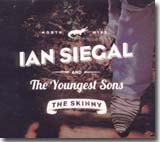 In the ’60s, numerous British musicians like the
Rolling Stones and Fleetwood Mac made the pilgrimage
to the U.S. to record with American bluesmen, which
eventually resulted in many of those blues artists
like Muddy Waters, Howlin’ Wolf, and Sonny Boy
Williamson, and others like Little Walter, Elmore
James, and Big Bill Broonzy, an opportunity to
receive more exposure from the young record-buying
public, most of whom wanted to know more about where
this great music came from.
In the ’60s, numerous British musicians like the
Rolling Stones and Fleetwood Mac made the pilgrimage
to the U.S. to record with American bluesmen, which
eventually resulted in many of those blues artists
like Muddy Waters, Howlin’ Wolf, and Sonny Boy
Williamson, and others like Little Walter, Elmore
James, and Big Bill Broonzy, an opportunity to
receive more exposure from the young record-buying
public, most of whom wanted to know more about where
this great music came from.
In the 21st century, British blues rocker Ian
Siegal continues this tradition by travelling to
Mississippi to record with an all-star cast of Hill
Country musicians, hopefully to achieve the same
results. Siegal’s latest effort is The Skinny
(Nugene Records), a genre-buster that originated in
the late Jim Dickinson’s North Mississippi studio.
His backing band took on the name The Youngest Sons,
an appropriate moniker given their background.
Drummer Cody Dickinson (North Mississippi Allstars)
is the youngest son of Jim Dickinson,
guitarist/bassist Garry Burnside is the late R.L.
Burnside’s youngest son, guitarist Robert Kimbrough
is the youngest son of Junior Kimbrough, and drummer
Robb Bland is the youngest son of soul/blues legend
Bobby “Blue” Bland. Rounding out the band is even
more impressive musicians – Alvin Youngblood Hart
(guitar/vocals), Andre Turner (fife, vocals), R.L.’s
grandson Duwayne Burnside (drums), and Quintez
(drums).
Siegal’s feral growl is the perfect match for these
11 tracks, ranging from the menacing title track
with opens the disc and serves as a fitting
introduction for what’s ahead. “Stud Spider,”
written by Tony Joe White mixes rap, blues, and the
swamp with Kimbrough’s masterful solo and
Dickinson’s electrified washboard (called a “woogieboard”).
Other highlights include “Hound Dog In The Manger,”
with more strong fretwork from Kimbrough, “Picnic
Jam,” a light-hearted romp which features Garry
Burnside on vocals and guitars, with Hart providing
vocal support, “Natch’l Low (Coolin’ Board),” a
“Rollin’ and Tumblin” melody featuring a
triple-guitar assault from Siegal, Garry Burnside,
and Kimbrough, and “Devil’s In The Details,” a
traditional fife and drum track with
call-and-response vocals and Andre Turner’s fife.
The disc concludes with a couple of noteworthy
tunes, “Garry’s Night Out,” features Siegal on
bottleneck guitar with Garry Burnside adding eerie
vocals that are strongly reminiscent of another
young Mississippi bluesman from over a half century
ago. The closer, “Hopper (Blues For Dennis),” is
Siegal’s tribute to the late actor and ends the
album on a high note, and serves as a tour de force
for Siegal’s scorching guitar.
The Skinny is a blistering set of rocked-out
Mississippi Hill Country blues. Siegal’s the real
deal with his rugged vocals and guitar, and he’s got
an excellent band in support. This is a strong
release from start to finish that you will be
playing over and over.
--- Graham Clarke
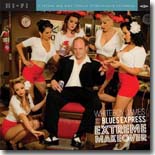 Whiteboy James & the Blues Express have been
a part of the West Coast blues scene since the late
1980s, epitomizing the hard-edged modern L.A. sound,
gritty and grungy. Their latest release, on Rip Cat
Records, is called Extreme Makeover and
serves as a primer on the modern West Coast sound.
James’ powerhouse vocals and harmonica is aided by
guitarist Scott Abeyta, bass player Blake Watson,
and the appropriately named drummer Max Bangwell.
Over the past 30 to 40 years, these musicians have
backed such familiar names as Hollywood Fats, Robert
Lucas, William Clarke, Rob Piazza, T-Bone Walker,
Ike Turner, George “Harmonica” Smith, and James
Harman.
Whiteboy James & the Blues Express have been
a part of the West Coast blues scene since the late
1980s, epitomizing the hard-edged modern L.A. sound,
gritty and grungy. Their latest release, on Rip Cat
Records, is called Extreme Makeover and
serves as a primer on the modern West Coast sound.
James’ powerhouse vocals and harmonica is aided by
guitarist Scott Abeyta, bass player Blake Watson,
and the appropriately named drummer Max Bangwell.
Over the past 30 to 40 years, these musicians have
backed such familiar names as Hollywood Fats, Robert
Lucas, William Clarke, Rob Piazza, T-Bone Walker,
Ike Turner, George “Harmonica” Smith, and James
Harman.
Extreme Makeover includes several familiar
songs from the band’s repertoire, such as “Excuse Me
for Scribblin’” and the countrybillyfied “Zerg,
Shotgun, & You.” The bluesy shuffle “Mean Mistreat’n
Woman” features some tasty guitar from Abeyta, as
does the rocking “Gold Brick Bar,” though in more of
a rock and roll vein. “Night Train Wine” leans more
toward the R&B side of the blues, with some
additional great guitar work, while “Slow Down and
Let Me Love You” is a showcase for Whiteboy James’
harmonica.
Ten of the tracks are originals and are notable for
their originality and wit. The pair of covers are a
couple of keepers --- the aforementioned “Slow Down
and Let Me Love You,” penned by Ike Turner, and a
roaring, rocking version of Willie Dixon’s chestnut,
“I’m Ready.”
If you like your blues down and dirty, with an eye
to the blues sounds of yesteryear, Whiteboy James &
the Blues Express offer just what you’re looking for
with this smoking set.
--- Graham Clarke
 Rob Lutes & Rob MacDonald have been playing
together for over ten years. The duo’s most recent
release, Live, was recorded at the cozy Le
Red Room, about 90 minutes out of Montreal in the
town of Glenn Sutton. The intimate setting, clean,
crisp sound, and the appreciative audience, not to
mention the seamless interplay between the artists,
make this one of the best live albums you’ve heard.
The pair’s striking, understated playing and rapport
set the standard for live recordings. Lutes plays
guitar and handles the vocals, while MacDonald
serves as a perfect complement on Resophonic guitar.
Rob Lutes & Rob MacDonald have been playing
together for over ten years. The duo’s most recent
release, Live, was recorded at the cozy Le
Red Room, about 90 minutes out of Montreal in the
town of Glenn Sutton. The intimate setting, clean,
crisp sound, and the appreciative audience, not to
mention the seamless interplay between the artists,
make this one of the best live albums you’ve heard.
The pair’s striking, understated playing and rapport
set the standard for live recordings. Lutes plays
guitar and handles the vocals, while MacDonald
serves as a perfect complement on Resophonic guitar.
Of the 14 tracks, ten were written by Lutes, and
most appeared on his previous discs. Standout
originals include the opener, “Uptight,” “I Know A
Girl,” inspired from a line in a Robert Johnson
tune, “I Will Stand By You,” previously recorded by
Dawn Tyler Watson, “I Still Love You,” “Keep A Man
Down,” and a tribute to singer/songwriter Chris
Whitley, “If The Blues Don’t Shake You.” The four
cover tunes include Sleepy John Estes’ “Drop Down
Baby,” transformed into an acoustic guitar workout,
a lively take on the traditional “Ain’t Noboby’s
Business,” the Chris Whitley-penned “Phone Call From
Leavenworth,” and the Bee Gees hit, “To Love
Somebody.”
Lutes’ guitar work is first rate and his gravelly
vocals sometimes are reminiscent of John Hiatt, as
is his songwriting. MacDonald’s accompaniment is
sublime. He’s always right where he needs to be. The
understated backing vocals from Jozy Fever and
Claire Hayek blend in perfectly. If you’re an
acoustic guitar fan, you must have this recording.
You will have to search far and wide to find a
better live recording of its kind.
--- Graham Clarke
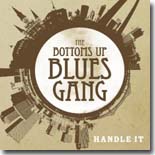 Out of St. Louis, The Bottoms Up Blues Gang
has been together for over a decade, mixing the St.
Louis blues and New Orleans jazz. Sultry singer Kari
Liston and singer/guitarist Jeremy Segel-Moss front
an impressive array of local musicians playing an
equally impressive array of instruments, including
kazoo. The band’s third release, on Blue Skunk
Records, is called Handle It.
Out of St. Louis, The Bottoms Up Blues Gang
has been together for over a decade, mixing the St.
Louis blues and New Orleans jazz. Sultry singer Kari
Liston and singer/guitarist Jeremy Segel-Moss front
an impressive array of local musicians playing an
equally impressive array of instruments, including
kazoo. The band’s third release, on Blue Skunk
Records, is called Handle It.
Liston and Segal-Moss wrote nine of the ten tunes
here and they vary from the opening title track,
which serves as background for the St. Louis blues
scene, to the jaunty kazoo/clarinet-fueled “First of
May” and the harmonica-driven “New World Blues.”
“More I Get, The Less I Got” is a delicious slice of
Memphis soul complete with tight horn section and
burbly Hammond B3. “If Only” is a lovely slow blues
that features Liston’s gentle vocals backed only by
Segal-Moss’ guitar and Adam Andrews’ harmonica.
“Show Your Love,” with its punchy horns and
keyboards, sounds for all the world like a Crescent
City R&B chestnut from long ago, and “Quick Fix for
Livin’” is a delta-flavored tune. The album’s lone
cover is a dandy --- a reworking of Ray Charles’
“Drown In My Own Tears,” which features the guitar
work of St. Louis blues legend Bennie Smith, who
passed away shortly after this recording.
Handle It is basically a love letter to the
city of St. Louis and its music, but listening to
the diverse set of tunes presented by The Bottoms Up
Blues Band, one discovers that the St. Louis blues
has roots in many places, from New Orleans to the
Delta to Memphis and points beyond. This is a nice
piece of work that deserves to be heard.
--- Graham Clarke